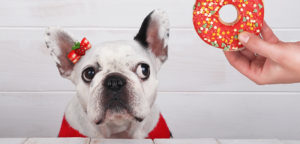
The holidays are an exciting time of year full of get togethers, gifts and delicious food. While we’re focused on a season full of parties and fun times, a pet might think differently. Extra noise and visitors can leave pets feeling stressed. As we keep holiday and winter tips in mind for people, there are holiday and winter tips for our furry friends, too.
Here’s what to you need to know to keep pets safe this holiday season.
Food
We all know there’s an overabundance of food during the holidays. From sweet treats, to delicious meals, it’s easy to give in to the begging eyes of a four-legged companion. However, it’s important to note that just because food and drinks are people-friendly; it’s not the same for pets. Here’s a list of what foods to avoid giving your pet.
Say no to sweets. We’ve all heard that dark chocolate is dangerous for dogs, however, bread dough and cookie batter are just as dangerous. Dough can actually rise in your pet’s stomach, casing bloating and severe pain. Plus, just like their owners, pets can get salmonella poisoning from raw eggs in cookie batter.
Bones and beyond. It’s tempting to offer your dog a special holiday “bone” right from the turkey your family just enjoyed. However, bones can get stuck in their intestines if they are brittle. On that note, make sure you dispose of bones carefully, just in case a sensitive nose goes sniffing where it shouldn’t.
Skin from a turkey is also a no-no. The skin is full of fatty juices and butter, and can be difficult for your pet to digest. High-fat foods can also lead to pancreatitis.
H2O only. While we know pets shouldn’t consume anything other than water, you may find your pet taking a sip or two from an unattended glass, filled with an adult beverage. While dogs love the smell of beer, the hops in beer are toxic to a dog’s system.
Spice is not so nice. On your pet’s digestive system that is. Sage is a popular seasoning used at Thanksgiving, and while it’s delicious for pet owners, it can cause pets to have upset stomachs or even more serious digestive trouble.
Nutmeg is another culprit that can wreak havoc on your pet. The popular spice used in pumpkin pie can cause seizures and central nervous system problems if your pet digests it. Pumpkin on its own is a safe treat for pets. Just avoid anything that is seasoned with nutmeg.
Decorations
From trimming the tree, to stringing the lights and all the holiday ambiance we create in between, decorations definitely pique pets’ curiosity this time of year. Here’s what to keep in mind when you’re setting up and displaying your holiday décor.
Trimming the tree. Cats have been known for seeing a Christmas tree as the ultimate climbing tower. Make sure your tree is securely anchored to avoid a serious fall. If you have a real tree, it’s important to keep pets away from the tree water, which can be a breeding ground for bacteria, not to mention toxic depending upon the tree food you use. There are several recipes online for creating your own non-toxic tree food to keep your tree lasting throughout the holiday season.
Tinsel gets tangled. Tinsel is especially dangerous for cats. Its shiny appearance is a magnet for inquisitive cats. However, if ingested, the tinsel can wrap around the intestines or get balled up in the stomach causing severe pain and (expensive) surgical removal.
Ornaments are not toys. Holiday ornaments add an element of beauty and tradition to your Christmas tree, however, it’s important to recognize that glass ornaments could cut your pet’s mouth or digestive system if swallowed or damage their paws if stepped on. Other ornaments to watch for are homemade salt ornaments. While fun to make, salt ornaments can be fatal to a pet because of the high amount of salt at one time.
DeLIGHTful holidays. Lights are everywhere during the holidays—indoors and out. Try to keep electrical cords out of the reach of pets. Inquiring minds could confuse lights as a new chew toy and end up with a shocking surprise.
Adding spark to the holidays. Make sure your pets steer clear, or better yet, can’t reach any candles this holiday season. While candles are an integral part of holiday celebrations and traditions, our pets aren’t as careful as we are. Make sure candles are out of reach of paws (and tails), or better yet, choose a flameless battery option that you can “light” without worry.
Holiday Plants
Holiday plants are often purchased or given to enhance a home’s décor during this festive time of year. Here are three popular holiday plants that can be dangerous to pets.
Forgetta the poinsettia? Actually, this popular Christmas plant isn’t as dangerous for pets as people think, but it can make pets sick. According to the Pet Poison Helpline, poinsettias have milky white sap that when ingested can cause skin irritation and mild vomiting and drooling. There is a low level of toxicity, if a poinsettia is ingested.
Holly doesn’t equal jolly. Your pet will be feeling anything but jolly, if a holly berry or leaf is ingested. Nausea, vomiting and diarrhea could occur almost immediately after your furry friend takes a bite.
Skip the kiss. If you find you and your pet under the mistletoe…run. Mistletoe, while fun to have around, is very dangerous for pets. If ingested, mistletoe can cause gastrointestinal and cardiovascular problems.
Your best bet? Purchase silk or plastic versions of these popular holiday plants to avoid any unwanted trips to the pet ER.
Seasonal Fun
It’s great to include your pets in family celebrations, holiday parties and holiday road trips. There are special considerations to keep in mind when your pets are involved with your holiday traditions.
Ringing in the New Year. Whether you’re ringing in the New Year with a small group of family or friends, or having a mini Times Square celebration in your house, make sure you think of your pet. Noise makers can scare pets or even cause damage to their sensitive ears, while confetti can get stuck in your cat’s intestines if ingested. An increased number of party-goers can also cause added stress to your pet. It might be a good idea to make sure your pet is in a secure and comfortable place before the clock strikes midnight.
Traveling with pets. From packing their “belongings,” to preparing for travel in a car or plane, pets have their own checklists for travel. Here’s what you need to keep in mind before you travel with your pet this holiday season.
Keeping pets warm. As the temperatures drop, it’s important to think of our four-legged friends. From dressing smaller dogs in sweaters or coats (gift idea perhaps?) to keep them warm, or booties to protect paws of all sizes, there are many “clothing” items and options available to keep our pets warm this winter. If your pet has to be outside during the day, make sure their enclosure is protected from the wind. Finally, keep your pet’s age in mind. Just as humans are more sensitive to the elements as we grow older, so are our pets.
If you’ve read through this post, you know we love our pets! They have special places in our hearts during the holidays and throughout the year. Enjoy this holiday season with your pets (and family).
Make sure everything in your home is covered this holiday season and beyond. Check out the ERIE Difference and see what we’re all about.

Recent Comments